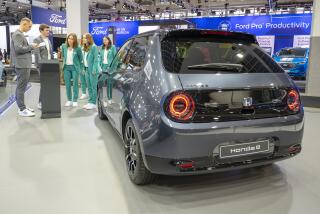Toyota Plans U.S. Sales of Gas-Electric Hybrid
- Share via
Toyota Motor Corp. announced Tuesday that it will start exporting its fuel-efficient hybrid-power Prius sedan to North America and Europe in the fall of 2000.
More than 7,700 of the four-door compacts have been sold in Japan since their domestic launch in December.
Jeremy Barnes, spokesman for Toyota Motor Sales USA in Torrance, said it is “a safe bet” that U.S. marketing efforts will concentrate on California and New York.
The Prius sells in Japan for about $15,000. No price has been set for the U.S., Barnes said, but “the goal is to keep pricing as competitive as we can.”
Toyota, Japan’s biggest auto maker, said it hopes to sell about 20,000 Priuses a year in overseas markets.
The car, which is about the size of Toyota’s Corolla, has achieved fuel efficiency of 66 miles per gallon using Japanese testing standards while reducing emissions of carbon monoxide and other pollutants.
Prius was designed at Calty, Toyota’s Southern California studio in Newport Beach. Its hybrid system incorporates a 1.5-liter gasoline engine and an electric motor. It operates on electricity at low speeds and switches automatically to the gasoline engine at higher speeds, depending on load and driving conditions.
The system’s design allows the Prius to recharge its battery without ever being plugged into an energy source. It routes power from the gasoline engine through an on-board electric generator.
But “fuel efficiency is not enough to sell a car” in the U.S., Barnes said. Before being sold here, the Prius will be adapted to American design tastes and requirements, such as having the steering wheel on the left side--as well as emissions standards.
Several other Japanese auto makers are also rushing to bring hybrid vehicles to market, including Nissan Motor Co., which hopes to launch its own version in January.
In the U.S., the Partnership for a New Generation of Vehicles, a joint research and development effort by the government and auto makers, last year picked a hybrid electric-diesel vehicle as its most promising technology for a more fuel-efficient car.
The California Air Resources Board is studying changes to regulations to allow hybrid vehicles to qualify as zero-emissions equivalent.
Much of the push to develop low- or zero-emissions vehicles stems from the board’s mandate that by 2003, 10% of new cars sold in California by the seven largest manufacturers must be zero-emissions vehicles. New York and several other states have adopted similar requirements.






